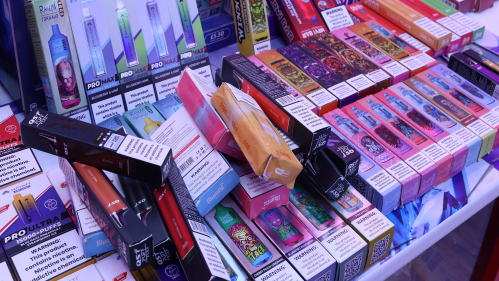Lawsuits Could Choke Off the Candy‑Flavored Vape Pipeline

Most convenience stores feature rows of colorful vapes promising tastes of cotton candy or iced mango, but none of them should be there.
The Food and Drug Administration (FDA) has authorized 34 electronic cigarette products. Four menthol vapes are the only flavored products on the list. The fruity-flavored e-cigarettes are all illegal.
What’s the solution? A new paper from representatives of Rutgers Health and New York City advocates a barrage of state and local lawsuits against distributors.
“The FDA is trying to regulate cigarettes like pharmaceuticals, and it lacks the resources to make it work,” said Kevin Schroth, an associate professor at the Rutgers School of Public Health and lead author of the BMJ Tobacco Control article.
Schroth and his co-author, New York litigator Eric Proshansky, lay out a vape-control plan that echoes the 1998 master settlement with big tobacco: Instead of aiming for overseas factories or the corner stores, state and local lawsuits should target domestic distributors, which bridge Chinese assembly lines and American cash registers.
“Distributors are the bottleneck,” said Schroth, who holds appointments at the Rutgers Institute for Nicotine and Tobacco Studies. “There are thousands of stores but only a handful of companies moving the product around.”
The paper lists a legal toolbox topped by the Prevent All Cigarette Trafficking Act, which can levy heavy fines, along with public‑nuisance and racketeering claims that helped secure more than $1 billion from Juul in 2023.
The strategy is already moving. New York City’s suit against Magellan Technology and other wholesalers, filed in 2023, survived a dismissal bid in May 2024 and has spun off two companion cases. In February, the New York state attorney general sued 13 of the nation’s largest vape distributors. California, Illinois and Vermont filed similar complaints this year, accusing firms of distributing unauthorized disposables into markets that ban flavored tobacco altogether.
Fines in New Jersey start at $300 and escalate, yet inspections are sporadic, and many small shops gamble on quick sales. Chain outlets tend to be more cautious, Schroth said, but even they have been caught with flavored stock.
High‑school vaping peaked at 27% in 2019 during what’s known as the Juul boom, Schroth said, then fell to about 10% after flavor crackdowns and the pandemic.
Since then, the average disposable’s liquid capacity has quintupled, its nicotine strength has tripled, and prices have dropped. Advocates fear cheap, high‑dose gadgets could spark another surge if enforcement stalls.
The paper by Schroth and Proshansky avoids any call for prison terms and seeks instead to hit lawbreakers in the pocketbook.
“We want stiff financial penalties that force distributors to play by the rules or leave the market,” Schroth said.
If enough attorneys general pile on, distributors may decide that stocking only FDA‑cleared vapes is safer than another courtroom fight.
That, Schroth said, “could finally align what’s on the shelves with what’s legal.”


